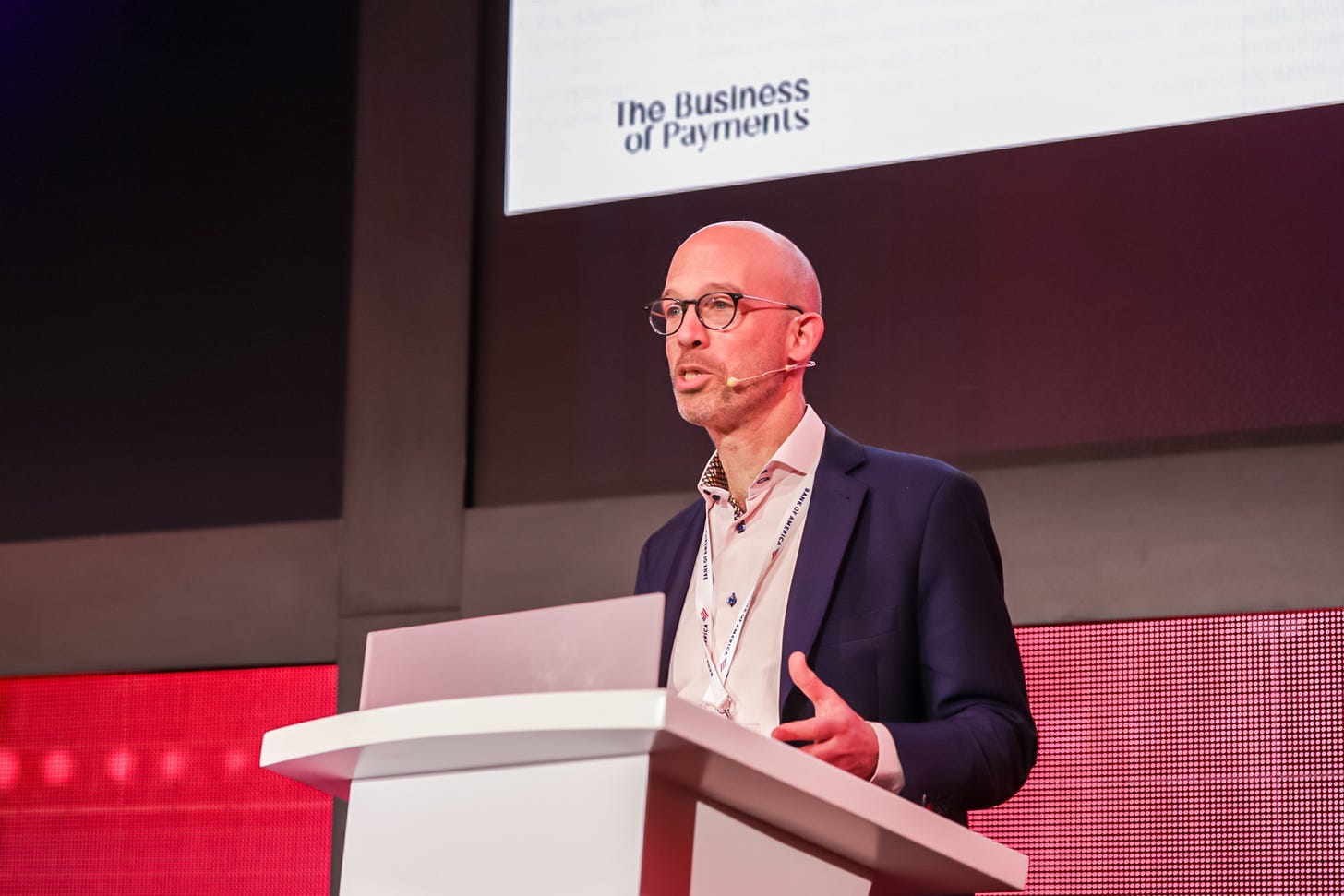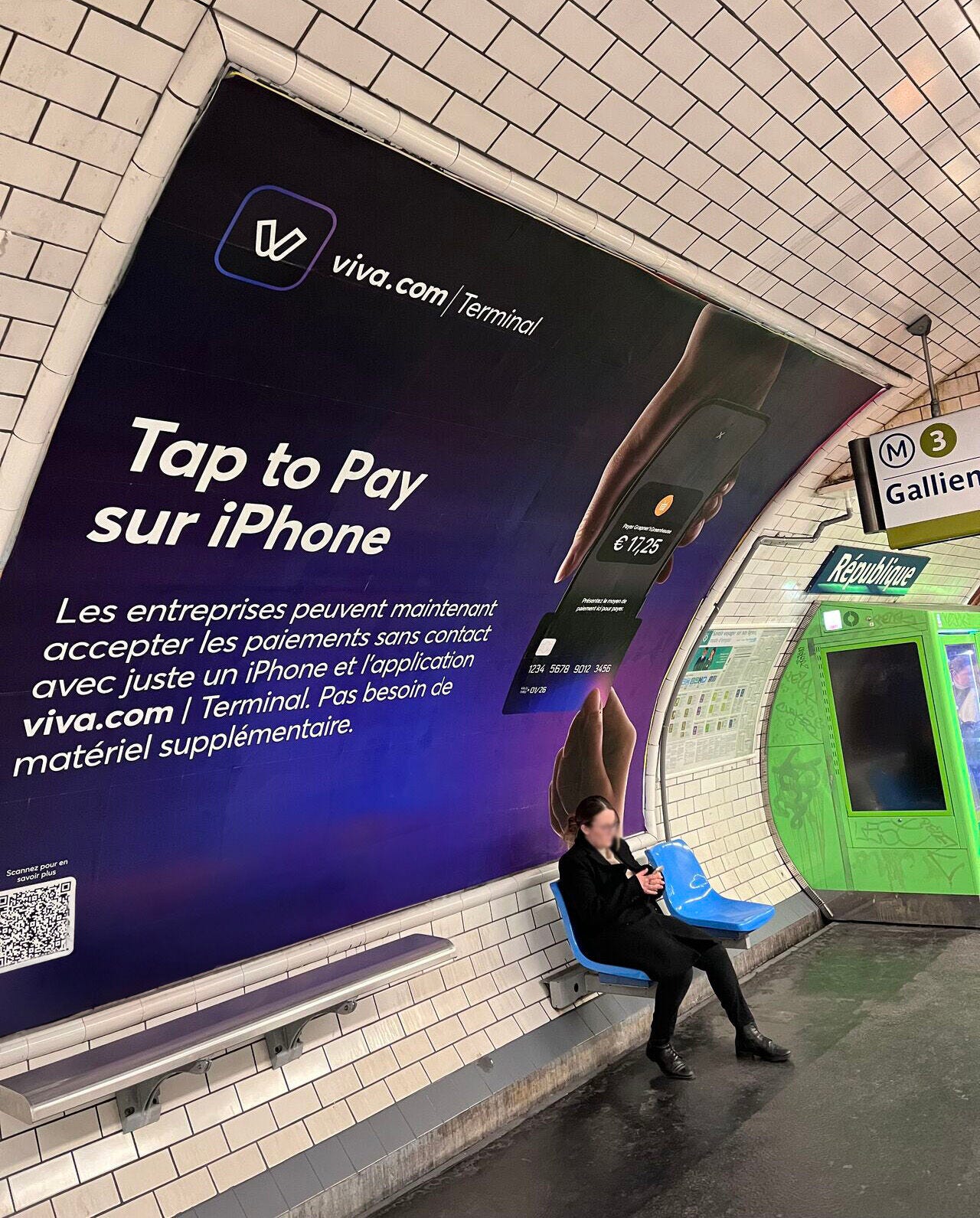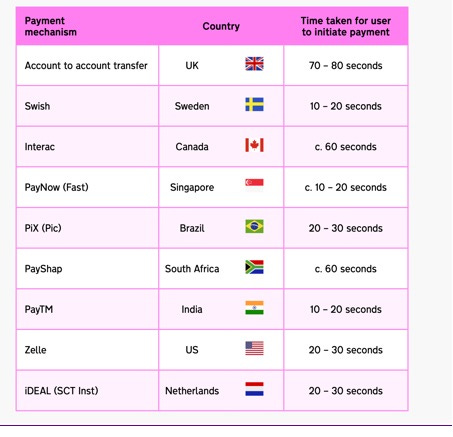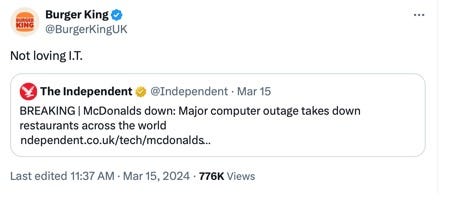The Payment Business
Forrester’s latest analysis of merchant payment providers makes for fascinating reading. The scoring can be a little incoherent at times but the report includes unparalleled direct feedback from Forrester’s clients. Stripe and Adyen come out best but don’t escape criticism. Stripe is “expensive” and Adyen’s support “can be hit and miss.”
Global Payments and Worldline, neither of whom participated in the research, score badly. Forrester doesn’t think either has done enough platform integration.
To celebrate its top spot, Adyen has made the report available free of charge. It’s worth a read and a reminder to always engage with analysts. The more you communicate – product roadmaps, customer testimonials, invitations to events etc – the better coverage you get.
Forrester aside, Worldline had a good month by recent standards. The beleaguered processor has won the fight with arch-rival Nexi to become the exclusive partner of Cassa Centrale Group. The deal doubles the size of Worldline’s Italian business by adding more than 90,000 POS terminals processing €9bn annually.
The next Italian bank up for grabs is Banca Popolare di Sondio which is reportedly considering selling its merchant services business and ending its partnership with Nexi. Worldline is said to be in poll position to pay €70-€100m for 25K POS processing €2.2bn. Nexi, BCC Pay and Market Pay are also in the running.
Worldline has also finalised its JV with Credit Agricole in France. Meriem Echcherfi, currently head of merchant services at the French bank, will run the new business which will should be live in early 2025. This is smart move. The first rule of bank partnerships is to hire your general manager from the bank.
Nexi reported decent full year results with merchant services revenue up 6% in Q4 2023 and a particularly good performance in Germany. Management will be relieved that Unicredit, Italy’s largest bank, looks set to renew it partnership with Nexi and extend the relationship to additional countries.
Stripe celebrated becoming cashflow positive for the first time. This takes the pressure off a possible IPO. “We’re not in a rush,” said the CEO. Stripe’s 2023 letter to shareholders was very bullish but didn’t disclose the company’s revenue or profit numbers.
The letter did reveal that payment volume rose 25% in 2023 to exceed $1tn and that the business is increasingly servicing larger merchants. More than 100 of Stripe’s clients process over $1bn and it has been signing good omni-channel customers such as Hertz. The car rental giant is moving its worldwide payment acceptance to Stripe including installing BBPOS terminals in 3,000 locations. The big win for Hertz is to be able to accept Apple Pay. Although this seems a low bar, it’s a real pain point in the US.
PAX Technology had a difficult 2023 as key customers showed "increased prudence in payment terminal deployment." Revenue was down 18% to $860m and profits down 12% to $150m. In Europe, PAX called out good performances in Italy, the United Kingdom, Turkey, Spain and France but Germany proved more challenging.
Although than 50% of sales are Android terminals, PAX is struggling to generate revenue from services. Sales of SaaS solutions associated with the 11m devices connected to MAX Store were just $13m.
Paypoint, one of the UK’s leading ISO’s, will consolidate all its processing with Lloyds Bank Cardnet. Paypoint’s 20,000 merchants deliver around £7bn volume and the acquiring relationship had been at risk, notably from Global Payments Inc., which inherited a chunk of Paypoint’s merchants when it bought EVO last year. It looks like Lloyds’ ability to extend its offer to include a bank account and commercial card won the deal.
We saw several interesting fund raises this month.
PPRO, the white label local payments platform, raised €85m, taking its total investment to an eye-popping $462m. PPRO has some great customers including Stripe and PayPal and insiders tell me it hopes to be EBITDA positive by the end of 2024.
Flowpay, the Czech merchant cash advance specialist, raised €2.1m to expand out of its home market. Already boasting key local ISV partnerships including Dotypos, Storyous and Shoptet, Flowpay is one to watch.
Bezahl, a Cologne based supplier of payment acceptance to car dealers, raised €22m. The business already has 130 clients serving 1,100 locations. Bezahl charges a monthly fee per location and sends most transactions to Adyen for processing
Staying in Germany, REWE, the supermarket giant, has spun out its payment acceptance team with the brand name of Payment Tools. REWE’s strategy mirrors that of its French rival, Carrefour, which demerged its payment division as MarketPay.
Finally, GoCardless has bought Nuapay, a specialist in SEPA Instant, UK direct debits and open banking, from EML Payments, the hapless Australian processor, for €34m. Nuapay, based in Ireland processes €44bn of A2A transactions annually and is forecast to lose €1.2m EBITDA this year. GoCardless also revealed its latest financial results in an exclusive interview with Sifted. Discussing a substantial loss of £80m on sales of £92m, the CEO said “The results demonstrate that we’re moving from strength to strength.”
MPE 2024
This year’s Merchant Payment Ecosystem conference in Berlin was as good as ever. Read this special edition of Business of Payments to discover more about the end of cards, digital Euro and the slow uptake of open banking.
I moderated an entertaining panel discussion nominally about consumer behaviour but actually covering a variety of topics from Saudi investment in Fintech to why Finland’s largest retailer chose Adyen for its payment processing. The panelists were Adil Riaz from NearPay, a SoftPOS vendor, Gábor Bujáki from OTP Bank, Hungary’s largest acquirer, Janine Kaiser from The Payments Association EU and Kai Lindström from S-Group, Finland’s largest retailer. Click on the photo to watch the conversation.
Schemes
Visa and Mastercard’s landmark deal to end 20 years of US litigation on “swipe fees” attracted much press coverage. The schemes have conceded an average 7bp reduction in Interchange paid to card-issuing banks. Although retailers will have more freedom to introduce surcharging, it’s likely that large merchants on IC++ pricing will see most of the benefits. Consumers may be annoyed by some potentially rather complex POS flows as merchants attempt to calculate differential surcharges by card type.
Immediately after this announcement, Mastercard revealed it was increasing scheme fees in the US. Just like a casino, the house always wins.
On this side of the Atlantic, leading French retailers including SNCF and Auchan report that the transaction share of Carte Bancaire, the domestic card scheme, has fallen from 97% to 85% in just three years. Shoppers are increasingly choosing to pay with mobile wallets or Visa/Mastercard branded cards issued by the neo banks. The retailers are not happy, saying that international cards cost 1.2% on average compared to 0.9% for CB.
JP Morgan has become the first US bank to join Carte Bancaires. A spokesman said the move was “mainly a request from our customers, the use of the [CB] network being less expensive than that of other card networks."
Ireland no longer has a local scheme so it’s hard to understand recent thinking in Dublin. Ireland’s Central Bank announced that the country’s payments strategy “needs drastic change” only months after the competition authorities killed an attempt to do just this by outlawing the introduction of a domestic mobile payment scheme. Revolut, which is wildly popular in Ireland, will likely profit from this regulatory confusion.
Blik, the fast-growing Polish mobile payment standard, has restated its international ambitions. With launches already planned in Slovakia and Romania, management believes “Blik Euro” could become a pan-European payment system. Local vendors are innovating with Blik. Posnet is offering Blik acceptance at cash registers without the need for a payment terminal. eService (Global Payments) is providing the processing. Fees are 0.6% + 1.4c.
Wero, the new QR based mobile payment scheme promoted by the European Payment Initiative is supposed to launch in June. However, the EPI has not posted any news on its website since December. We await updates with interest.
Capital One has revealed more of its plans for Discover, the US card network it hopes to acquire later this year. The new owners want to “fix” the network’s international acceptance, “which is not quite where it needs to be, for the entirety of our card business today,” said its VP Finance.
New Shopping
Amazon shocked the industry by axing its “Just Walk Out’ Stores in the USA, resulting “a few hundred” layoffs in its technology team. Instead, the company will focus on its new range of Smartcarts. Retail analysts conclude that Just Walk Out technology does not scale for large format stores – it’s too expensive and needs too much manual intervention. Amazon had previously revealed that 1,000 staff in India acted as “virtual cashiers” for its autonomous stores.
While there still seems a strong business case for Just Walk Out in small format stores, Amazon’s decision will come as a blow to other retailers that have bought its technology, presumably to benefit from Amazon’s well-funded roadmap. One of these may be Delaware North, a hospitality vendor that has just installed Just Walk Out technology to sell beer at London’s Wembley Stadium.
Other vendors are available. Lekkerland has installed three AI-based smart fridges at an EV charging station in Saxony. You tap your payment card, open the door, remove the items and are automatically billed. Portuguese start-up, Reckon.ai is providing the technology.
We’ve been talking about RFID to automate grocery checkouts for over twenty years but it’s still not ready. Walmart has withdrawn a pilot in which it used RFID to verify whether customer’s self-scanned purchases were accurate.
Sometimes simpler is better. Take a look at Sticky, a Manchester-based start-up which allows consumers to pay by simply tapping a cheap NFC label. “You can get a drink in five seconds with our physical digital labels. It’s faster than a card,” says the CEO. Sticky charges £60/month for eight “flows.”
Product
Retailers say that returns abuse is the leading source of fraud, overtaking phishing for the first time. Here’s a good round up from Edgar Dunn which shows the scale of the challenge. Unsurprisingly, this trend is leading to a big increase in chargebacks so why don’t retailers dispute more of them? One reason may be the risk of offending good customers. This New York restaurant complained when a customer used a chargeback to reclaim a deposit for a cancelled booking and the ensuing argument became very public.
The UK has a cunning plan to fight fraud. New legislation will make Faster Payments slower to give PSP’s time to investigate suspected bad transactions.
Dwayne Gefferie lays out the strategic case for PSP’s to move into orchestration or infrastructure-as-a-service. Or both. However, it’s not clear how much money is in orchestration. One analyst says the market will grow from $846m today to $4.8bn by 2032. Aite, a more reliable source, suggest the actual revenue reported by dedicated fintech orchestrators today is less than $25m. Looking on the bright side, Aite says “there’s plenty of room for providers to grow.”
Merchants are divided on whether to go with a single payment provider or use “orchestration” to manage a series of best of breed vendors. Hugo Boss is using Adyen for all its in-store and online requirements. Why not use multiple suppliers? “We are not a petrol station. We are Hugo Boss,” explains the retailer’s head of payments.
InPost, Poland’s last mile delivery specialist, has launched a payment wallet called InPostPay. It could do well as it builds on an installed base of over 9m mobile app users.
Many are sceptical about Click to Pay but the schemes’ much delayed attempt to compete with one-click wallets is finally coming to Europe. ING is offering Click to Pay with Mastercard, initially in Spain. Visa has launched Click to Pay in France where Adyen is the first PSP to offer the product. It claims 4% points increase in authorisation rates compared to a standard transaction.
ISVs and their payment partners are scrambling to offer pay-at-table. Toast, the US restaurant software vendor, has launched in the UK with an impressive solution running on Adyen’s POS hardware. “Long battery life and durable,” says one IT Director.
Revolut launched its acquiring business in 2021 but we heard little news until it launched point of sale software with integrated payments. Aimed at retail and hospitality, Revolut POS is based on Nobly, the ISV it bought in 2021. The software appears to be free and transactions start from 0.8% and 2c for domestic cards. International cards are 2.6% which is pricey for any merchant in a tourist location.
Here’s a good case study from the introduction of contactless ticketing across 60,000 validators covering the whole Dutch public transportation network. The new system is saving money and travellers seem happy. EMS (Fiserv) is the acquirer. Meanwhile, Getnet has resigned the Madrid bus network including acceptance, gateway and acquiring.
There’s a small but growing category of software vendors aiming at making life easier for people who run payment businesses. Kani, founded in Newcastle, reconciles PSP transaction data with the information provided by the card schemes. Torus, started by an ex Mastercard consultant, won the innovation competition at MPE with its pricing software that gives acquirers better control over their portfolio profitability. Both are worth a look.
SoftPOS
SoftPOS is a downloadable payment application that turns any Android or iOS device into a payment terminal. The standards regime is quite complicated. Matt Jones gives a good explainer of how it all fits together.
This technology seems finally ready for prime time. Tabesto, a vendor of intelligent ordering tools for restaurants, says 90% of sales are a new product called Fox, an integrated all-in-one kiosk with no external POS or printer. Customers can choose SoftPOS payment apps from Worldline or DejaMobile. Here’s it is in action at Waffle Factory.
Deja Mobile, based in France and now owned by MarketPay, has some good case studies. Two months after launch with Rabobank in the Netherlands, 1,200 micro-merchants have activated the service of which 80% are generating transactions.
I’m not convinced PSPs can make any money out of micro merchants but if you want a mass-market customer base you will need to spend money on marketing. Best of luck to Viva, the mPOS vendor partly owned by JPMorgan, which has launched a major advertising campaign in France.
Softpay is another vendor in the news, announcing a partnership with Elavon, targeting SMEs in the Nordics. SoftPay is now listed on the Sunmi app store giving access to a broad range of merchants.
Rubean, the German softPOS vendor quoted on the Munich stock exchange, expects 2024 revenue of c.€2.5m, doubling year on year but below expectations. The company predicts sales rising to c.€10m by 2027 on the back of new contract wins including Commerzbank Global Payments.
BT, still the UK’s largest telco, is offering SoftPOS to its 1m SME customers with Adyen is providing the technology. The service is good value. All transaction are priced at 1.4% and there is no monthly fee. BT’s move could start a trend. Ericsson says mobile operators worldwide want to offer financial services to their customers.
Openbanking
Growing disquiet at the UK’s slow progress on open banking was highlighted by a speech made by Chris Hemsley of the Payment Systems Regulator to the Pay360 conference.
Referring to emerging rules for variable recurring payments (VRPs), widely believed to be the best hope of driving mass market adoption, the regulator says it has asked the industry to “get on with it.” Jack Wilson from TrueLayer takes issue with this and writes the industry is now “moving at the pace of the slowest” and that the slowest is the regulator itself. The industry is complaining that it is in limbo waiting for the results of a consultation on how open banking should be priced and without a clear way of making money, has little incentive to commercialise new products.
The lack of an acceptance mark or scheme brand is also major stumbling block. Looking at the checkout page below, how would consumers know they can pay with their banking app? Clue: Vyne is an open banking vendor.
Despite the current uncertainty, there is some good news. Ecospend, Trustly’s UK business says that 30% of payment volumes at Hargreaves Landsdowne, a retail investment manager, are made using open banking.
Ecospend has been the supplier to HMRC (the UK tax authority) which has long been the poster child of UK open banking payments. With Ecospend’s initial 3 year term completed, HMRC is retendering its banking contract. The winner is likely to be one of the 15 vendors selected to join the Government’s framework contract.
In partnership news, Nexi has selected Mastercard as its open banking provider. Mastercard’s product is based on a white-label of Token’s service. Visa-owned Tink has won a contract from Deutsche Bahn for direct debit setups to power its bike sharing service and also a deal with Micropayment, a Berlin-based PSP.
A number of vendors are building an interface to allow open banking payments at POS using contactless NFC in place of cumbersome QR codes. Kevin, the Lithuanian fintech which made some high-profile layoffs before Christmas, has demonstrated A2A NFC payment on iPhone. Click through and read the comments which indicate some scepticism.
MultiPay, the UK POS focused PSP is doing something similar. Acquired.com is providing the open banking connections. Assuming the technology works, is there a business case? Alexander Peschkoff explains why A2A payments at POS don’t have commercial appeal.
More importantly, A2A payments may just be too slow for POS. A killer table from the UK Future of Payments Review shows the time it takes for a user to initiate a payment. PIX is regarded as best in class but, with Apple Pay as a comparator, even 20 seconds is too slow for POS merchant payments. Shoppers will keep using cards for a long time yet.
Artificial Intelligence
Klarna’s CEO has clarified that although the company’s AI chatbot is doing work equivalent to 700 people, this is entirely unrelated to the 700 people he layed off in 2022.
It doesn’t matter how clever your chatbot. RSR Resarch says consumers want to talk to a real person.
But the AI demos keep getting better. This ChatGPT video certainly passes the Turing Test.
Possibly, one of the most appropriate uses of AI is to count the number of mentions of AI in corporate earnings calls. Hat tip to PayPal. And to FXC for asking its robots to research this pressing question.
In other news
In a disastrous week for the UK payment industry, there were outages at Greggs, Sainsburys, McDonalds and Tesco. Although the incidents do not seem connected, the regulator is investigating. McDonalds blamed a “configuration change” but Burger King had the last word.
Rapyd’s Icelandic boss hit back at calls for a merchant boycott following the Group CEO’s strong support for Israel’s war in Gaza. “Claims such as that Rapyd works in Israeli settlements in the West Bank and that the company supports the Israeli army's war on Gaza are completely false”, he wrote.
A fascinating piece from Matt Jones on the rise of Ali/Wechat Pay and the implications for Chinese soft power. On a similar theme, FXC looks at Asian QR code payment schemes and asks what happens when they become interoperable.
It’s been a good month for bloated corporate buildings. Fiserv has finally opened its new $37m HQ. “Welcome to Milwaukee. We have been waiting for you Fiserv,” said the mayor. PAX went bigger. Its new $46m HQ in Shenzen is 18 storeys high.
Payments from a Merchant Perspective - useful (and free) research from Arkwright. Standardised and low-friction open banking is their number one ask.
We may think of payments as an environmentally friendly business but Edgar Dunn calculates transaction processing generate 3.3m tonnes of greenhouse gases each year. And card production releases a further 1m.
Wirecard latest. Dan McCrum, the FT journalist who broke the story, gives a good interview to Chris Skinner. Four years on, the story itself gets even stranger. It seems that Jan Marsalek, Wirecard’s fugitive COO, was working for Russian intelligence and has recently been living in Russia under the assumed identity of an Orthodox priest.
And finally
Kevin Hart, the US comedian, bought a bored ape NFT in January 2022 for $200,000. This is a particularly fine ape which sits under a rare “spinner hat.” Hart just sold the NFT for $47,000. Which still seems a lot for a jpg, even one as fine as this.
Where to find me
I’ll be moderating the open banking panel discussions at ePay Europe in London on 21 May. Before that, you can catch me at Retail Expo in London on 24/25 April.
And I’ll be at Money 20/20 in Amsterdam on 4 June.
And you can hear me guesting on Worldline’s Navigating Digital Payments podcast.
How to get in touch
Geoffrey Barraclough
geoff@barracloughandco.com














Thanks for the mention. I met the founder of Sticky at a Fintech North event last year. He demoed the product extremely well in person. Some of the use cases he showed were really interesting. Also payments is integrated really well into the platform with various providers.